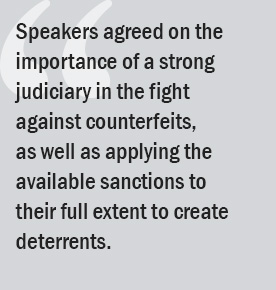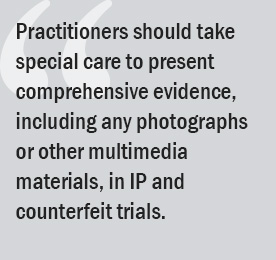INTA News
Judges Workshop in Nairobi, Kenya, Receives Standing Ovations
Published: December 15, 2019
 INTA held a workshop for judges from October 29 to October 30 in Nairobi, Kenya. This was the Association’s first such workshop in Africa. The highly successful event, sponsored by the International Development of Law Organization (IDLO), and supported by the Kenyan Judicial Training Institute (JTI) and the Anticounterfeiting Agency (ACA), provided an overview of the basics of intellectual property (IP) rights and proceedings, including such issues as nontraditional marks, bad-faith filings, and the dangers and harmful effects of counterfeiting. Speakers included INTA members, ACA officials, the Law Society of Kenya (LSK), and the Industrial Property Tribunal of Kenya (IPT).
INTA held a workshop for judges from October 29 to October 30 in Nairobi, Kenya. This was the Association’s first such workshop in Africa. The highly successful event, sponsored by the International Development of Law Organization (IDLO), and supported by the Kenyan Judicial Training Institute (JTI) and the Anticounterfeiting Agency (ACA), provided an overview of the basics of intellectual property (IP) rights and proceedings, including such issues as nontraditional marks, bad-faith filings, and the dangers and harmful effects of counterfeiting. Speakers included INTA members, ACA officials, the Law Society of Kenya (LSK), and the Industrial Property Tribunal of Kenya (IPT).
Throughout the event, sessions received enthusiastic standing ovations from the judges and also appreciation in the form of a variety of clap rhythms such as the “3-3-3-1” or the so-called “environmental clap” (which is actually performed by snapping the fingers). We were told that this kind of “specialty clapping” is a widespread custom in Kenya to express approval.
On the first day of the workshop, Hazel Okoth (Gikera & Vadgama, Kenya) highlighted the basic principles of protection for various IP rights in Kenya. Liz Lenjo (MyIP, Kenya) discussed the difference between protectable and unprotectable subject matter under Kenyan law. Next, William Maema (Iseme, Kamau & Maema, Kenya) discussed the national and international regulatory frameworks, while Shem Otanga (Anjarwalla & Khanna, Kenya) covered well-known marks and bad-faith filings, and Peter Hime (Kaplan & Stratton, Kenya) presented the options for contentious proceedings before administrative and judicial authorities.
During a banquet held on Tuesday evening, the judges in attendance explained the nature of their workload, which consists of hundreds of cases a month from every possible legal field. In Kenya, unlike many other jurisdictions, there is no division between even criminal and civil courts, resulting in a wide range of legal subject matters that judges must handle on a daily basis. As a consequence, it is highly difficult for the judiciary to have detailed knowledge of all of these legal areas. This made the judges workshop all the more relevant and appreciated by those in attendance.
Day 2 began with a panel on anticounterfeiting, in which John Evans (Diageo Plc, Kenya) presented reports on cases of counterfeiting, parallel imports, and smuggling in the alcoholic beverage industry. ACA Executive Director Elema Halake gave a presentation that included a short video on counterfeit tires, demonstrating the risks associated with counterfeit products, especially when these serve a sensitive safety function in consumers’ daily lives.
 Ms. Halake noted that the ACA has recently been removed from Kenya’s ports, where the organization had been supporting customs inspections. The immediate negative impact on the import of counterfeit and other illegal goods is already being noticed by rights holders, he explained.
Ms. Halake noted that the ACA has recently been removed from Kenya’s ports, where the organization had been supporting customs inspections. The immediate negative impact on the import of counterfeit and other illegal goods is already being noticed by rights holders, he explained.
Next, Carol Theuri (Rouse Africa, Kenya) presented the enforcement options in counterfeit matters. The session concluded with a summary of INTA’s engagement on anticounterfeiting and parallel imports. The speakers agreed on the importance of a strong judiciary in the fight against counterfeits, as well as applying the available sanctions to their full extent to create deterrents.
The judges in the subsequent plenary session agreed that the general lack of awareness of the issues surrounding counterfeits was widespread, and that the information presented in the workshop helped them realize the extent of the problem as well as the role of the judiciary in combating counterfeiting. One of the concrete demands the judges voiced was that practitioners should take special care to present comprehensive evidence, including any photographs or other multimedia materials, in IP and counterfeit trials. Such evidence would allow the judges to assess and decide the matter based on the full details of the case. “Treat us like babies which were recently born” one of the judges commented, to explain the significant need for thorough preparation and exhaustive presentation of these cases.
The various types of judicial proceedings and their requirements, as well as case examples from their IP practice, were presented by John Syekei and Terry Mwango (both of Bowmans, Kenya). Brown Kairaria (IPT, Kenya) gave a summary of cases before the IPT, a specialty tribunal for patent, industrial design, and utility models. In the subsequent interactive session, judges were asked what professionals could do to make cases easier for judges to handle. The responses included suggestions to consider more concise, less redundant and repetitive submissions in view of the existing overload of files and papers.
The final session, presented by Cecil Kuyo and Dan Mwathe (Bowmans, Kenya), covered specialty issues in IP litigation, including evidentiary requirements, permitted defenses, burden of proof, and damage awards. Maria Mbeneka (LSK, Kenya) added comments on a variety of case studies to highlight the issues encountered in IP trials.
In his closing remarks, JTI Director Kathurima M’Inoti thanked all participants, sponsors, and especially INTA for the organization and hosting of this workshop. He remarked that in this age of technological innovation and advancements, discarding IP as a “nontraditional” area of the law is no longer a valid viewpoint. Instead, he noted, judges today need to understand IP and engage with the topic in order to effectively handle the matters before them. The JTI welcomed continued engagement with INTA and encouraged discussions about repeat educational programs for the judiciary, perhaps as early as 2020.
INTA would like to thank all participants, presenters, the IDLO for the sponsorship, the JTI for organizing the workshop, the ACA for providing its insights on counterfeits, and the judges for being a welcoming, receptive, and engaged audience.
Although every effort has been made to verify the accuracy of items in the INTA Bulletin, readers are urged to check independently on matters of specific concern or interest.
© 2019 International Trademark Association